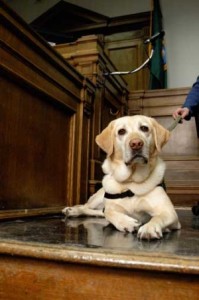 Ellen O’Neill-Stephens is an attorney in Washington state. Her background includes prosecuting crimes against children – sexual assault, neglect, abuse and other serious crimes.
Ellen O’Neill-Stephens is an attorney in Washington state. Her background includes prosecuting crimes against children – sexual assault, neglect, abuse and other serious crimes.
Back in 2003, her household included her son Sean, who has cerebral palsy, and Jeeter, a trained service dog and companion to Sean. There were days when Sean was with a caregiver, which left Jeeter alone at home. So she started bringing Jeeter with her to juvenile drug court.
One day a fellow prosecutor asked if Jeeter could help calm two young girls. They were scheduled to testify against their father in an emotionally charged sexual abuse case. “During cross-examination the kids and the defense attorney were stroking Jeeter,” recalls O’Neill-Stephens. “It was just people having a conversation around a dog, and it worked for everyone.” Jeeter made such a difference that the juvenile department decided to add a “full time” service dog to its staff. There are now four courthouse dogs in Washington state.
Calming, nonjudgmental dogs help children during difficult conversations
At a recent Crimes Against Children Conference, a Washington state prosecutor described another case where Jeeter made a difference. “Sometimes, these children will say things to the dog that they’re too embarrassed to say to a person. … We had a girl who had been severely abused and she could never talk about it. But she petted Jeeter for over 90 minutes straight and she was able to tell what happened.”
O’Neill-Stephens tells the dramatic story (PDF) of a five-year-old boy, Joey, who witnessed the violent assault of his mother by his father. Joey’s mother, Sophia, was pressured by her extended family to minimize the incident in court. By interacting with a service dog, Joey was able to describe the assault.
The prosecuting attorney later commented: “Using Ellie [the service dog] for trial didn’t just help me win the case, it also provided a calming effect on Joey, who was certainly a primary victim in this case, and assisted him in his rehabilitation as a victim and witness to a horrific event. I got a call from Sophia just before the sentencing. She told me that she and Joey were living together in an apartment and that they were alone now because everyone in their family hated them. But she also said for the first time in their lives they felt free.”
The expanding use of courthouse dogs
According to O’Neill-Stephens, the calming presence of a dog can be highly effectively in many courthouse situations. “When you have a defense attorney down on [his or her] knees patting the dog before [plea] negotiations, that starts everything off in a friendlier way.”
The practice of using service dogs in courthouses is growing. The journal of the American Bar Association recently wrote about a judge who would like to see a dog in every courthouse. “Dogs put smiles on people’s faces, and there usually aren’t a lot of smiles in a courthouse,” said Judge Emmet Ferguson.
Thanks to Thaddeus Pope of Medical Futility for pointing out this story. He suggests that dogs would make excellent members of hospital ethics committees, where hospital staff and patients’ families discuss difficult and stressful end-of-life issues.
Related posts:
Want your wallet returned? Include a baby (or puppy) pic
Baby RB: Ethical dilemmas of modern medicine
Animals
Pets
Sources:
(Links will open in a separate window or tab.)
Anna Stolley Persky, Going to the Dogs–in a Good Way, ABA Journal, December 1, 2009
Jenny B. Davis, At this Prosecutor’s Office, a Furry Soft Spot for Kids, ABA Journal, July 1, 2007
Selwyn Crawford, Courthouse Dogs program puts pets on the case to aid young crime victims, Dallas Morning News, August 20, 2009
Ellen O’Neill-Stephens, Courthouse Dogs: A Case Study, ABA Committee News, Summer 2009 (PDF)
Thaddeus Pope, Dogs for Ethics Committees and Ethics Consultants, Medical Futility Blog, December 7, 2009
Courthouse Dogs website


Sorry, comments are closed for this post.